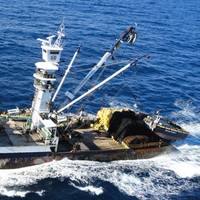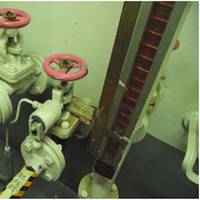South Pacific Tuna Reports Improved Safety

U.S. South Pacific Tuna Corporation pointed to the tuna industry’s 2013 record of zero fatalities in response to a recent report, implication of safety concerns and 2012 violations from foreign officers license certification, as cited in a recent press release from Coast Guard Sector Guam. The company’s track record of overall operational safety and ongoing policy improvement work in cooperation with the United States Coast Guard in Washington, D.C., as well as the Fourteenth Guard District in Honolulu…
Coast Guard Foundation Honors Scholars

The Coast Guard Foundation, a non-profit organization committed to the education and welfare of all Coast Guard members and their families, recognized its Commander Daniel J. Christovich Scholarship awardees and 2013 college graduates at its recent 9th Annual Tribute to the United States Coast Guard in Washington DC. The Daniel J. Christovich Scholarship is generously funded by Lisa Kazor Christovich in honor of her husband's distinguished career in the Coast Guard. The scholars honored at the dinner were Joseph "Joey" Heimburger of Gloucester…
U.S. Coast Guard Marine Safety Alert 04-11
MARINER'S SAFETY ENDANGERED WHEN VHF RADIO DISTRESS ALERTS BY DIGITAL SELECTIVE CALLING (DSC) LACK LOCATION AND IDENTIFICATION INFORMATION. As the Coast Guard's new marine radio network Rescue 21 becomes operational throughout the U.S., rescue centers can now receive instant distress alerts from commonly used DSC-capable VHF marine radios. However, approximately 90% of VHF DSC distress alerts received by the Coast Guard do not contain position information, and approximately 60% do not contain a registered identity. The Coast Guard cannot effectively respond to a DSC distress alert sent from such a radio. * no position information is known. FIRST Obtain a Maritime Mobile Installation Identity (MMSI) and enter it into your radio.
Neilson Appointed Academic Dean at Webb
Webb Institute announced the appointment of Mr. Richard P. Neilson as its next Academic Dean. Neilson will assume responsibility for the academic program on July 1 of this year, succeeding Dr. Roger H. Compton, Dean since 1998. Mr. Neilson, a 1970 graduate of Webb, returns to his alma mater after a long and distinguished career in the marine industry. Immediately after graduation he worked for the United States Coast Guard in Washington, D.C., in the Design Branch of their Naval Engineering Division. From 1974 to 1979 he was with Newport News Shipbuilding and Dry Dock Company and then with Sun Shipbuilding and Dry Dock as a naval architect in the Tanker Product Group and as Supervisor of Structural Engineering. In 1979 Mr.
USCG Safety Alert: Inspection of Fuel Oil Quick-Closing Valves

U.S. Coast Guard Port State Control Officers (PSCOs) are discovering Fuel Oil Quick-Closing Valves (QCVs) intentionally blocked, modified, and poorly maintained preventing them from operating as designed during an emergency. QCVs are positive shutoff valves on fuel oil systems serving to isolate fuel tanks in the event of a fire and also prevent “fueling” of a fire in circumstances where system piping and components are compromised. In some circumstances they could be the only means of securing the fuel to a flammable liquid fire. These valves are designed to be remotely operated.
Marine Safety Alert: Propulsion Loss, Fuel Switching
Ships switch fuel oil from residual fuels to distillate fuels in order to reduce emissions. The Coast Guard expects ships will switch fuel more frequently to comply with new emission reduction regulations. When switching fuel oil, some ships have experienced propulsion losses linked to procedural errors or fuel oil incompatibility. API developed a paper titled “Technical Considerations of Fuel Switching Practices” that discusses problems that lead to propulsion loss while switching fuel. It is available at http://marineinvestigations.us. This document may be useful to vessel owners, operators, and engineers interested in preventing fuel system failures and propulsion casualties while meeting current and future exhaust emission control requirements.
Electronically Controlled Cargo Pump Engines
For many years, cargo pump engines on weather decks of Subchapter D & O tank barges had mechanical-type start and control systems. The installation of electronically controlled engines on tank barges since the 1990s has introduced non-approved electrical equipment associated with engine monitoring and control systems into hazardous locations (Class I, Division 1) on thousands of tank barges nationwide. U.S. Coast Guard District Eight recognized this problem with John Deere manufactured engines and distributed enforcement guidance to their field units on November 22, 2005. Since then, John Deere has engineered retrofit packages for approximately 400 units and is currently seeking approval from the U.S. Coast Guard Marine Safety Center (MSC).







